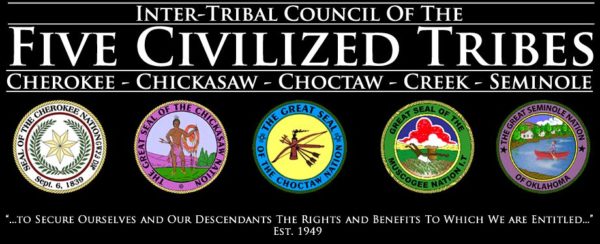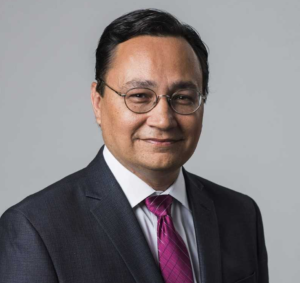
- Details
- By Chuck Hoskin Jr
The Inter-Tribal Council of the Five Civilized Tribes is comprised of the governments of the Cherokee, Chickasaw, Choctaw, Muscogee (Creek) and Seminole tribes and works to protect tribal self-determination and sovereign rights. These five tribal nations collectively represent more than 750,000 Indian people throughout the United States, with the largest concentration in Oklahoma.
It was an honor to be elected president of ITC at the organization’s recent quarterly meeting held at the Hard Rock Hotel and Casino Tulsa, and I look forward to serving in that capacity for the upcoming year.
 Cherokee Nation Principal Chief Chuck Hoskin, Jr.
Cherokee Nation Principal Chief Chuck Hoskin, Jr.
I look forward to working with the other tribal leaders: Chickasaw Nation Governor Bill Anoatubby, Choctaw Nation Chief Gary Batton, Seminole Nation Principal Chief Greg Chilcoat and newly elected Muscogee (Creek) Nation Principal Chief David Hill. While each tribal government has its own unique culture and history, our five tribes share similar issues and concerns, including how we best provide critical services - education, health care and housing - to our citizens.
Working in solidarity means we can better protect our self-governance. By sharing best practices and successful ideas, we can do more good for all our citizens and our state. We have a long and successful history of forging partnerships and building coalitions that improve the lives of all Oklahomans.
Collaboration at the Inter-Tribal Council goes beyond tribal leaders. The organization also brings together tribal councilors and employees of the member tribes. We all benefit by being involved and are able to celebrate in the achievements of the participating tribal governments. All of us, together, promote positive agendas at the federal and state levels. Resolutions approved by the Inter-Tribal Council establish a unified message for our tribes that is more powerful than any of us would be on our own.
Founded in 1949, it is one of the oldest and largest tribal organizations in America. A longstanding spirit of unity defines the council, and today it is as relevant and important as ever, maybe more so, as we stand united on critical issues facing our sovereign governments. Enemies of our tribal sovereignty will always attempt to divide us, but when we work together, we leverage resources to help even more people, including our non-Native neighbors.
In Oklahoma, we have the largest concentration of Native people in the U.S., and our tribal governments are strong. Individually, each of our tribes is doing positive things for elders, youth and our communities. This benefits not only our tribal citizens, but all of Oklahoma.
I look forward to leading this essential organization in 2020, knowing the leaders of the Five Tribes believe in protecting our tribal rights. We remain united on important issues, including government-to-government relationships, compact discussions, economic development, budget issues, cultural preservation and access to quality health care for everyone.
Through the Inter-Tribal Council, we will continue to work in a spirit of cooperation and build progressive outcomes. The strength of the tribes is one of Oklahoma's greatest assets, and the Inter-Tribal Council makes us even stronger.
More Stories Like This
Native News Weekly (August 25, 2024): D.C. BriefsUS Presidents in Their Own Words Concerning American Indians
Two Murdered on Colville Indian Reservation
NDAA passes House; Lumbee Fairness Act Advances
NFL, Vikings to Host Native All-American Game, Youth Flag Clinic
Help us defend tribal sovereignty.
At Native News Online, our mission is rooted in telling the stories that strengthen sovereignty and uplift Indigenous voices — not just at year’s end, but every single day.
Because of your generosity last year, we were able to keep our reporters on the ground in tribal communities, at national gatherings and in the halls of Congress — covering the issues that matter most to Indian Country: sovereignty, culture, education, health and economic opportunity.
That support sustained us through a tough year in 2025. Now, as we look to the year ahead, we need your help right now to ensure warrior journalism remains strong — reporting that defends tribal sovereignty, amplifies Native truth, and holds power accountable.
 The stakes couldn't be higher. Your support keeps Native voices heard, Native stories told and Native sovereignty defended.
The stakes couldn't be higher. Your support keeps Native voices heard, Native stories told and Native sovereignty defended.
Stand with Warrior Journalism today.
Levi Rickert (Potawatomi), Editor & Publisher
